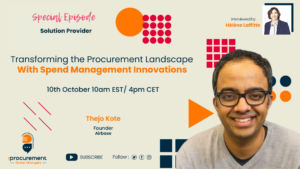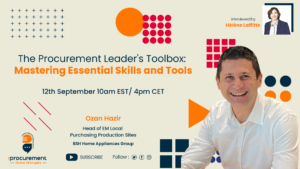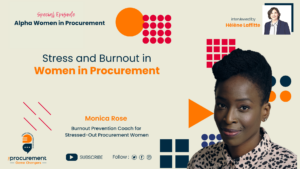Hélène:
So welcome to procurement game changers, the podcast for procurement leaders that make a difference today.
We’ll be talking about how to create ideation channels in procurement to boost ownership and personal drugs. And to discuss that topic, have the pleasure to receive Susanne Thöle director of procurement spot buy and indirect at Uniper, a global leader in energy transition.
Susanne is a very experienced procurement leader with a background covering all aspects of procurement from functional and operations standpoint in the energy sector.
Welcome to the show, Susanne.
Susanne:
Hi Hélène. Thanks for having me. It’s a pleasure.
Hélène:
So, Susanne, could you tell us what led you to procurement?
Susanne:
I would say I’ve always been in procurement. I have a background from the pharmaceutical industry where I worked for a daughter of Novartis from automotive, where I worked in the headquarters of Mercedes Car group for a couple of years. And then in 2006, I joined the energy industry and the first employer was Eon.
I always changed between more operational and more strategic roles that governance jobs. I have experience in direct and in indirect. So it’s pretty much everything. I would say. Maybe one highlight.
What I really like recalling is in 2012, I was invited by the CPO of Eon to join the core team office transformation. And together we transformed a 700 employees, strong, very decent procurement organization in Eon to a super successful centrally led category management organization.
This was really a cool experience for me. Today, I’m responsible, as you said, for spot buy and indirect. So I have three teams to look after.
The first one is IT procurement, the second is Corporate Services and the third one is our operative procurement looking after the whole of Uniper demands with people located in all the countries where Uniper operates in.
Hélène:
Wow. Thank you. So let’s go now and do the topic of this particular episode, which is around innovation.
So we have a lot of fuss around innovation and ideation is on the rise on the business side. But what about innovation? and ideation when it comes to procurement? So in your perspective, should ideation be part of the toolbox of the modern CPO?
Susanne:
For me, it’s not so much a toolbox topic. It is a mindset topic. Imagine a world where your category managers come to you and say: “I have a mind blowing idea. Can we please talk about this?” Wouldn’t this be lovely? So maybe the answer is a yes. Yeah, it should be part of every procurement organization.
Hélène:
So what are the direct benefits of implementing an ideation channels in procurement?
Susanne:
The first thing probably, and this was the first stage that we experienced. Yeah.
When you start with ideation, what people come up with is they look into their very direct environment and what you get then is people with procurement expertise proposing process improvements. So this gives you a very quick access tool, quick fixes and people getting experience with doing ideation.
What happens then, after a couple of ideas implemented, normally the people, they go out and they talk to business stakeholders. Yeah. And we supported this a bit.
And the question always was, what is it? Yeah. You in your business area that doesn’t let you sleep at night and how can we help you to get this done? And the third stage then is: we went out to suppliers.
Also, we are talk to the technicians, talk to their innovation departments and asking them, what is it that you’re working on that you could bring also to us benefiting both of the companies?
And this bringing all the knowledge to the table of all these three involved parties helps you to create very quick improvements, implement first ideas. And it’s a very cost effective way to get things done.
Hélène:
So beyond the direct bottom line impact, what other benefits do you see in that system?
Susanne:
It sounds a bit like not so important point. For me on the other hand, this is the core of the benefit: is a huge step in the cultural value of empowerment.
You see people talking about this or when somebody has implemented an idea, then they brag a bit, yeah. They tell you how great this has been.
What we experienced also was a boost in creativity. And this working together gets much better. Working together within procurement, across the borders of procurement and also with selected suppliers. This is the one big benefit. And the other one is more for the individual.
If you have an idea and you see this idea becoming reality and benefiting the people around you, this really makes something with you. And it makes you want for more creativity, [to] have another idea that you can implement. So this is really a driver for innovation within the whole area.
Hélène:
Could you explain for listeners how that system works in practice?
Susanne:
Yeah, sure. I can share what we did in Uniper. We wanted to get this started. And as a first topic, we had a very tiny ideation core team who helped the first ideas to come to life and organize a bit the process. What we also did: we organized a monthly ideation sprint review.
So every first Tuesday in a month at 10 o’clock, every procurement employee is invited to join. We do this as a virtual meeting. And this is the place for people and procurement who have an idea to come up and present this idea to the audience.
So normally out of the 150 people we have in procurement, some 92, a hundred attend, and they hear the idea, they give advice, they challenge a bit. And at the end of the show, we always do a voting. And the ideas who are turn out to be the best ideas, they get implemented.
And then we say the basic rule is always three months. So an idea needs to be implemented within three months. We don’t want this long winded ideas, which never come to an end. This means that the idea giver has to tailor this to a scope that is feasible within three months and they get resources.
So the idea giver doesn’t have to be the expert in the field where the idea comes from. So if, for example, IT knowledge is needed. Then they get a resource from IT. And all this, we put together, and then the idea owners can fire away.
And within these three months, they present the status that they have, also in these regular sprint reviews, so that the whole community knows where we are and when the implementation of the idea can be expected. This is a bit what we started with.
And now after two and a half years, I can see this really growing. So for example, we have started to do procurathon, which are supplier enabled innovation events.
And I also see people more and more using this ideation platform to share with the community, also, their projects, which maybe come also from their line functions.
So we have a lot of sharing of what are the newest bots that we implemented. What is an AI solution that helps us to within the process? What are the new features of the chat bot? So things like this, which are interesting for the whole community are also presented in these sprint reviews.
Hélène:
So what were the challenges at the beginning and how did you embark the organization into that initiative?
Susanne:
Yeah, the one and only challenge that we were facing is we don’t have time. Yeah. We don’t have time to staff this idea. We have to prioritize our day job over that idea.
So this is something that we were constantly facing in the beginning. What helps you there to get over this is a supportive CPO, which we have, and this is really, really one of the key drivers.
And then you can use the first results that you have, the first ideas that are implemented for doing marketing, showing again, the benefits to the community.
And then after a while, what kicks in is a very positive development of this cultural value of empowerment. People talking to each other, trying it out themselves because they’ve seen their peers doing an idea. And then this is the engine that brings and keeps ideation to life in the organization.
Hélène:
Yeah. That’s very interesting. It’s word of mouth actually that is making the last mile in the process. I imagine. So that’s extremely interesting. And I think that we’ll see the value here, both for the company and individuals in their professional growth.
I think that’s what it’s such an interesting topic. If we want the listeners to remember one thing from what we just said, what would that be?
Susanne:
What you should keep in mind is there is ideation power in your procurement team. It’s really there. You just have to capture what your colleagues come up with, and then you will see the benefits for both the company and the individuals. I would say, this is something that you should remember.
Hélène:
Yeah. That’s wonderful.
So now it’s your turn to tell us about your experience and your challenges in the comment section on the innovation ideation front.
Don’t forget to subscribe if you want to be notified when a new episode is out. Thank you for listening. Thank you again, Susanne, for your time.
And I hope you enjoying this episode and that’s the case. Just give us a thumbs up.
Happy sourcing to you, everyone.
And bye. Au revoir.
Ideation channels in procurement Ideation channels in procurement Ideation channels in procurement Ideation channels in procurement Ideation channels in procurement Ideation channels in procurement Ideation channels in procurement Ideation channels in procurement Ideation channels in procurement Ideation channels in procurement Ideation channels in procurement Ideation channels in procurement Ideation channels in procurement Ideation channels in procurement Ideation channels in procurement Ideation channels in procurement Ideation channels in procurement Ideation channels in procurement Ideation channels in procurement Ideation channels in procurement Ideation channels in procurement Ideation channels in procurement Ideation channels in procurement Ideation channels in procurement Ideation channels in procurement Ideation channels in procurement Ideation channels in procurement Ideation channels in procurement Ideation channels in procurement Ideation channels in procurement







